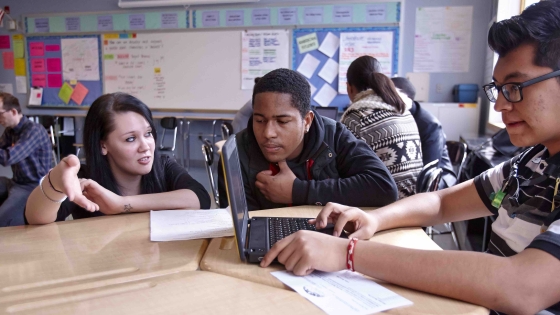In my last post, I described conversations with our staff, partners, and various stakeholders, focused on two key questions:
- How can we continue to enhance the Research Alliance’s impact?
- How should we adapt our approaches to meet the evolving needs of New York City’s education ecosystem?
Through these conversations, we have identified two overarching priorities for our work: Improving evidence use and centering equity in our research. In this post, I will discuss the motivation behind and broad approach to improving evidence use. Future posts will address our commitment to infusing equity throughout our work.
Why Focus on Evidence Use?
In recent years, there has been increasing attention on the gap between research on the one hand, and policy and practice on the other (see, for example, the “science of reading” movement). To bridge this gap, producing high-quality evidence, on its own, is insufficient; we must also ensure that insights from research are constructive and actually used by practitioners and policymakers to benefit students and communities. As noted by Tseng and Nutley (2014), it is clear that evidence use “is not a simple process whereby research ‘facts’ are passed from researchers to research users and then applied in a linear decision-making process. Instead, research use is contingent, interactive, and iterative. It involves people individually and collectively engaging with research over time, bringing their own and their organization’s goals, motivations, routines, and political contexts with them. Research also enters into the policy process at various times—as problems are defined (and redefined); ideas are generated; solutions are identified; and policies are adopted, implemented and sometimes stalled.” This understanding guides the Research Alliance’s work as we strive to improve the use of evidence in NYC’s education ecosystem.
Approaches to Increasing Evidence Use
The Research Alliance is taking a multi-pronged approach to increase the use of evidence we produce and contribute to. These strategies focus not only on the end product, but also on what kind and how evidence is produced and shared.
- Engaging a wider range of stakeholders, to inform and be informed by our work: This means continuing to deepen our relationships throughout the New York City Public School system, as well as with other practitioners, policymakers, community organizations, social service agencies, and knowledge brokers who influence education policy and practice in NYC. It also means seeking out and amplifying the voices and lived experiences of those at the center of our work–that is, teachers, students, parents, and community members. Collaborating with diverse stakeholders throughout the research process, from identifying research questions to collecting data and interpreting and sharing findings, increases the relevance, usefulness, and actionability of the evidence produced. Further, including diverse voices and amplifying lived experiences helps ensure that our work reflects the realities and needs of those we aim to serve, helps us avoid perpetuating biases and assumptions that can arise from limited perspectives, and enables us to consider a fuller suite of strategies for improving schools and promoting equity.
- Facilitating application of research: To increase the use of evidence we produce, the Research Alliance will prioritize translating research findings into practical tools for policy and practice. This includes developing rubrics, assessments and data collection tools, practice guides, and concrete policy recommendations that effectively communicate evidence-based strategies. Additionally, we will work to inject evidence into the public conversation through various channels, including the press, social media, and public events, to foster more informed discussions and generate support for evidence-based decisions.
- Expanding research capacity: By cultivating and supporting a diverse network of external research affiliates, we are able to contribute to evidence on a broader range of topics that matter to NYC students, schools, and communities. To do this, we hope to expand access to our extraordinary longitudinal archive of data on NYC schools and communities, with a particular focus on early career scholars of color and those who have historically been underrepresented in education research. To achieve this, we are exploring a variety of strategies, including research internships, mentorship and training programs, and developing resources to fund external researchers pursuing questions that can be answered with our data archive.
As we work toward putting these strategies in place, we invite you to share with us your feedback, reflections, and advice. What strategies for increasing evidence use have you found to be successful? What are potential pitfalls and threats to this work, and how might we avoid them? Reach out to us through LinkedIn, Instagram, X (formerly Twitter), or email at research.alliance@nyu.edu .
We look forward to hearing from you!
Sincerely,
Cheri Fancsali

